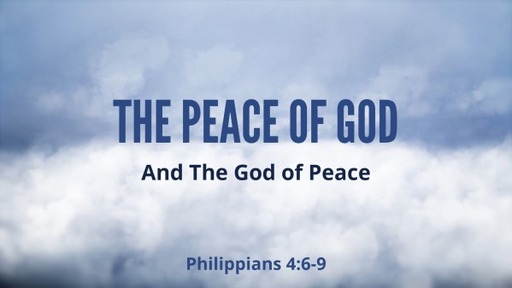The Peace of God and the God of Peace

OT Concept of Peace
It follows that “peace,” coming as it does from God, is closely related to the idea of salvation
NT Concept of Peace
Soteriologically, peace is grounded in God’s work of redemption; eschatologically, it is a sign of God’s new creation, which has already begun; teleologically, it will be fully realized when the work of new creation is complete.
Only in a secondary sense does peace refer to a psychological state consequent upon sharing in the all-embracing peace of God
Citizens of heaven have lives distinguished by peace
1. We receive the spiritual gift of peace through prayer
prayer is something very personal and specific, a genuine conversation with God. Moreover, since NT believers know God as their Father—with much greater clarity than anything their OT counterparts could have enjoyed—their praying proceeds from a childlike trust, as expressed in the typical NT form of address, “Father,” which Jesus taught his disciples to use
God’s peace is not the result of the power of our prayers or the effectiveness of our prayers. Prayer is not auto-suggestion, a form of self-hypnosis that produces God’s peace. Prayer is our openness about our needs before God, our emptiness in his presence, our absolute dependence upon him with an attitude of constant thanksgiving and complete trust. When we pray with that attitude, the focus is not at all upon what we are doing or will do, but on what God will do. God will do something supernatural beyond our best abilities and thoughts:
2. We receive the spiritual gift of peace through spiritual mindedness
C. We receive the spiritual gift of peace through close fellowship
The time has come to get out of the chair of theoretical reflection about Christ and the Christian life and press on toward the goal (3:14).
The promise of the presence of the God of peace (4:9) explains the promise of the peace of God (4:7): when the God of peace will be with you, then the peace of God … will guard your hearts and minds in Christ Jesus. Only God’s presence brings his peace. When the God of peace is present, the peace of God rules in the hearts and minds of his people.
